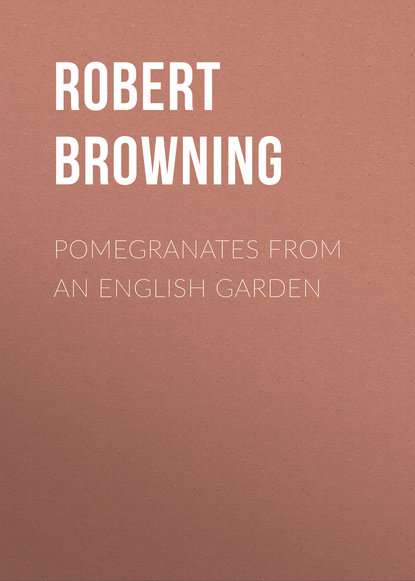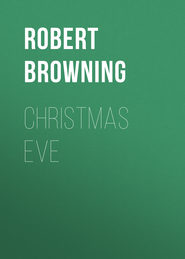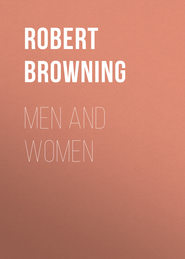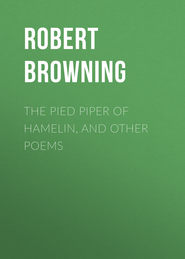По всем вопросам обращайтесь на: info@litportal.ru
(©) 2003-2024.
✖
Pomegranates from an English Garden
Настройки чтения
Размер шрифта
Высота строк
Поля
For earth had attained to heaven, there was no more near nor far.
V
Nay more; for there wanted not who walked in the glare and glow,
Presences plain in the place; or, fresh from the Protoplast,
Furnished for ages to come, when a kindlier wind should blow,
Lured now to begin and live, in a house to their liking at last;
Or else the wonderful Dead who have passed through the body and gone,
But were back once more to breathe in an old world worth their new:
What never had been, was now; what was, as it shall be anon;
And what is, – shall I say, matched both? for I was made perfect too.
VI
All through my keys that gave their sounds to a wish of my soul,
All through my soul that praised as its wish flowed visibly forth,
All through music and me! For think, had I painted the whole,
Why, there it had stood, to see, nor the process so wonder-worth.
Had I written the same, made verse – still, effect proceeds from cause,
Ye know why the forms are fair, ye hear how the tale is told;
It is all triumphant art, but art in obedience to laws
Painter and poet are proud, in the artist-list enrolled: —
VII
But here is the finger of God, a flash of the will that can,
Existent behind all laws: that made them, and, lo, they are!
And I know not if, save in this, such gift be allowed to man,
That out of three sounds he frame, not a fourth sound, but a star.
Consider it well: each tone of our scale in itself is nought;
It is everywhere in the world – loud, soft, and all is said:
Give it to me to use! I mix it with two in my thought,
And, there! Ye have heard and seen: consider and bow the head!
VIII
Well, it is gone at last, the palace of music I reared;
Gone! and the good tears start, the praises that come too slow;
For one is assured at first, one scarce can say that he feared,
That he even gave it a thought, the gone thing was to go.
Never to be again! But many more of the kind
As good, nay, better perchance: is this your comfort to me?
To me, who must be saved because I cling with my mind
To the same, same self, same love, same God: ay, what was, shall be.
IX
Therefore to whom turn I but to Thee, the ineffable Name?
Builder and maker, thou, of houses not made with hands!
What, have fear of change from thee who art ever the same?
Doubt that thy power can fill the heart that thy power expands?
There shall never be one lost good! What was, shall live as before;
The evil is null, is nought, is silence implying sound;
What was good, shall be good, with, for evil, so much good more;
On the earth the broken arcs; in the heaven, a perfect round.
X
All we have willed or hoped or dreamed of good, shall exist;
Not its semblance, but itself; no beauty, nor good, nor power
Whose voice has gone forth, but each survives for the melodist,
When eternity affirms the conception of an hour.
The high that proved too high, the heroic for earth too hard,
The passion that left the ground to lose itself in the sky,
Are music sent up to God by the lover and the bard;
Enough that he heard it once: we shall hear it by-and-by.
XI
And what is our failure here but a triumph’s evidence
For the fulness of the days? Have we withered or agonized?
Why else was the pause prolonged but that singing might issue thence?
Why rushed the discords in, but that harmony should be prized?
Sorrow is hard to bear, and doubt is slow to clear,
Each sufferer says his say, his scheme of the weal and woe:
But God has a few of us whom he whispers in the ear;
The rest may reason and welcome; ’tis we musicians know.
XII
Well, it is earth with me; silence resumes her reign:
I will be patient and proud, and soberly acquiesce.
Give me the keys. I feel for the common chord again,
Sliding by semitones, till I sink to the minor, – yes,
And I blunt it into a ninth, and I stand on alien ground,
Surveying awhile the heights I rolled from into the deep
Which, hark, I have dared and done, for my resting-place is found,
The C major of this life: so, now I will try to sleep.
Having given specimen poems dealing with the arts of poetry, painting, and sculpture, we add one on the subject of music, which, though difficult to understand fully, has beauties which are apparent even to those who do not enter into its deepest thought. Vogler is not known as a composer of the first rank, having left no works behind him which entitle him to a place among the great masters; but, for this very reason, he is better suited for the poet’s purpose, which is to deal with music, not as represented by printed notes, but as existing for the moment in all its perfection, and at once melting away into silence and apparent nothingness. It is as extemporizer, not as author, he is chosen, and as Abbé (Ger. Abt) he appropriately thinks of those deep spiritual truths on which the loftier hopes of the latter part of the poem are founded.
The musician “has been extemporizing,” – pouring out his whole soul through the keys of his organ, and from that state of ecstasy he suddenly awakes and cries out, “Would that the structure brave, the manifold music I build … might tarry!” It has been no mere “volume,” but a “palace” of sound. As Solomon (according to the well-known legend) summoned all spirits from above and from below, and all creatures of the earth, to build him a palace at once, so by a touch, “calling the keys to their work,” he has summoned demons of the bass, angels of the treble, earth creatures of the middle tones, who, by eager and tumultuous and yet harmoniously united efforts, have caused “the pinnacled glory” to “rush into sight” (stanzas 1-3).
Into sight? There was far more in it than could be seen. As the soul of the musician ascended from earth, heaven descended on him; its stars crowned his work; its moons, its suns were close beside him – “there was no more near nor far” (4). And the boundaries of time, as well as the limits of space, were gone. The absolute, the perfect was reached; and to this palace of perfection had flocked “presences plain in the place,” from the far Future and from the mystic Past. “There was no more sea” – no more distance or separation – all one, together, perfect (5). Reached how? Through music – the only one of the arts that leads into the region of the absolute and perfect, its effects not springing from causes the operation of which can be traced, and the law of their production defined, but responding directly to the will, even as creation responded to the fiat of God. Out of such simple elements can that be evoked, which should lead those who “consider” these things to “bow the head” (6, 7).
But was it only for a moment? Is it gone? Forever? (8).
I turn to God, and know it cannot be. Then follows that glorious passage, one of the finest in any language, every word of which should be studied, beginning – “There shall never be one lost good!” on to the end of stanza 11, which is the true climax of the poem.
V
Nay more; for there wanted not who walked in the glare and glow,
Presences plain in the place; or, fresh from the Protoplast,
Furnished for ages to come, when a kindlier wind should blow,
Lured now to begin and live, in a house to their liking at last;
Or else the wonderful Dead who have passed through the body and gone,
But were back once more to breathe in an old world worth their new:
What never had been, was now; what was, as it shall be anon;
And what is, – shall I say, matched both? for I was made perfect too.
VI
All through my keys that gave their sounds to a wish of my soul,
All through my soul that praised as its wish flowed visibly forth,
All through music and me! For think, had I painted the whole,
Why, there it had stood, to see, nor the process so wonder-worth.
Had I written the same, made verse – still, effect proceeds from cause,
Ye know why the forms are fair, ye hear how the tale is told;
It is all triumphant art, but art in obedience to laws
Painter and poet are proud, in the artist-list enrolled: —
VII
But here is the finger of God, a flash of the will that can,
Existent behind all laws: that made them, and, lo, they are!
And I know not if, save in this, such gift be allowed to man,
That out of three sounds he frame, not a fourth sound, but a star.
Consider it well: each tone of our scale in itself is nought;
It is everywhere in the world – loud, soft, and all is said:
Give it to me to use! I mix it with two in my thought,
And, there! Ye have heard and seen: consider and bow the head!
VIII
Well, it is gone at last, the palace of music I reared;
Gone! and the good tears start, the praises that come too slow;
For one is assured at first, one scarce can say that he feared,
That he even gave it a thought, the gone thing was to go.
Never to be again! But many more of the kind
As good, nay, better perchance: is this your comfort to me?
To me, who must be saved because I cling with my mind
To the same, same self, same love, same God: ay, what was, shall be.
IX
Therefore to whom turn I but to Thee, the ineffable Name?
Builder and maker, thou, of houses not made with hands!
What, have fear of change from thee who art ever the same?
Doubt that thy power can fill the heart that thy power expands?
There shall never be one lost good! What was, shall live as before;
The evil is null, is nought, is silence implying sound;
What was good, shall be good, with, for evil, so much good more;
On the earth the broken arcs; in the heaven, a perfect round.
X
All we have willed or hoped or dreamed of good, shall exist;
Not its semblance, but itself; no beauty, nor good, nor power
Whose voice has gone forth, but each survives for the melodist,
When eternity affirms the conception of an hour.
The high that proved too high, the heroic for earth too hard,
The passion that left the ground to lose itself in the sky,
Are music sent up to God by the lover and the bard;
Enough that he heard it once: we shall hear it by-and-by.
XI
And what is our failure here but a triumph’s evidence
For the fulness of the days? Have we withered or agonized?
Why else was the pause prolonged but that singing might issue thence?
Why rushed the discords in, but that harmony should be prized?
Sorrow is hard to bear, and doubt is slow to clear,
Each sufferer says his say, his scheme of the weal and woe:
But God has a few of us whom he whispers in the ear;
The rest may reason and welcome; ’tis we musicians know.
XII
Well, it is earth with me; silence resumes her reign:
I will be patient and proud, and soberly acquiesce.
Give me the keys. I feel for the common chord again,
Sliding by semitones, till I sink to the minor, – yes,
And I blunt it into a ninth, and I stand on alien ground,
Surveying awhile the heights I rolled from into the deep
Which, hark, I have dared and done, for my resting-place is found,
The C major of this life: so, now I will try to sleep.
Having given specimen poems dealing with the arts of poetry, painting, and sculpture, we add one on the subject of music, which, though difficult to understand fully, has beauties which are apparent even to those who do not enter into its deepest thought. Vogler is not known as a composer of the first rank, having left no works behind him which entitle him to a place among the great masters; but, for this very reason, he is better suited for the poet’s purpose, which is to deal with music, not as represented by printed notes, but as existing for the moment in all its perfection, and at once melting away into silence and apparent nothingness. It is as extemporizer, not as author, he is chosen, and as Abbé (Ger. Abt) he appropriately thinks of those deep spiritual truths on which the loftier hopes of the latter part of the poem are founded.
The musician “has been extemporizing,” – pouring out his whole soul through the keys of his organ, and from that state of ecstasy he suddenly awakes and cries out, “Would that the structure brave, the manifold music I build … might tarry!” It has been no mere “volume,” but a “palace” of sound. As Solomon (according to the well-known legend) summoned all spirits from above and from below, and all creatures of the earth, to build him a palace at once, so by a touch, “calling the keys to their work,” he has summoned demons of the bass, angels of the treble, earth creatures of the middle tones, who, by eager and tumultuous and yet harmoniously united efforts, have caused “the pinnacled glory” to “rush into sight” (stanzas 1-3).
Into sight? There was far more in it than could be seen. As the soul of the musician ascended from earth, heaven descended on him; its stars crowned his work; its moons, its suns were close beside him – “there was no more near nor far” (4). And the boundaries of time, as well as the limits of space, were gone. The absolute, the perfect was reached; and to this palace of perfection had flocked “presences plain in the place,” from the far Future and from the mystic Past. “There was no more sea” – no more distance or separation – all one, together, perfect (5). Reached how? Through music – the only one of the arts that leads into the region of the absolute and perfect, its effects not springing from causes the operation of which can be traced, and the law of their production defined, but responding directly to the will, even as creation responded to the fiat of God. Out of such simple elements can that be evoked, which should lead those who “consider” these things to “bow the head” (6, 7).
But was it only for a moment? Is it gone? Forever? (8).
I turn to God, and know it cannot be. Then follows that glorious passage, one of the finest in any language, every word of which should be studied, beginning – “There shall never be one lost good!” on to the end of stanza 11, which is the true climax of the poem.








